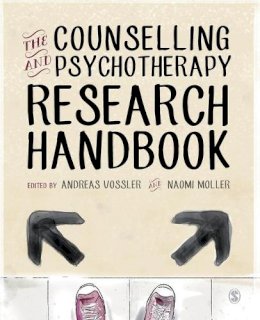
The Counselling and Psychotherapy Research Handbook
Unknown
Research is a vital and often daunting component of many counselling and psychotherapy courses. As well as completing their own research projects, trainees across modalities must understand the research in the field – what it tells them and how to do it.
Breaking down this seemingly mountainous task into easy to swallow pieces, this book will navigate your students through each stage of the research process, from choosing a research question, through the pros and cons of different methods, to data analysis and writing up their findings.
Written by leading contributors from the field including John McLeod, Mick Cooper and Tim Bond, each chapter features points for reflection, engaging activities and suggestions for further reading, helping students to engage with all aspects of research. An original graphic narrative runs throughout the book, bringing this complex topic to life in a unique way.
Whether embarking on research for the first time or already a little familiar with research and research methods, this unique guide is something counselling and psychotherapy students will turn to continually throughout their research projects.
Product Details
About Unknown
Reviews for The Counselling and Psychotherapy Research Handbook
Colin Feltham I think this is a most impressive text. The language employed is plain, accessible and inclusive and the editors have skilfully produced a coherent narrative without losing the distinctive voices of individual contributors. This will without doubt become required reading for anyone – novice or seasoned practitioner – who seeks a wise companion on their own research journey.
Professor Simon du Plock In an era of "big data" and evidence based practice, this book provides students and practitioners with an engaging and informative way into the world of counselling and psychotherapy research. It is essential reading for those starting to make sense of and engage in empirical study.
Andy Hill There have been plenty of publications on research as well as on training in counselling and psychotherapy. This wonderful handbook brings them together for the first time. It is a landmark publication: a comprehensive overview and a didactically excellent journey through the research process guided by experienced, well-known researchers. Research questions and planning; designs; methodologies and methods; organization and dissemination are discussed. It is ambitious but provides easily accessible expertise for students, practitioners and young researchers. It will have a large international impact on counselling and psychotherapy training and on the scientist-practitioner self concept of counsellors and psychotherapists.
Professor Frank Nestmann In true ‘handbook’ style, this engaging, comprehensive and motivational publication can be used as an exemplary reference tool throughout the research process. I would definitely recommend it to students, educators and researchers alike. Although it is intended primarily for students, there is much in its content for trainers and educators too.
Charlie Jackson, BACP Research Officer This book left me feeling excited and enthusiastic about conducting research - something I have not felt previously. It is a must for all students and practitioners. Whether you have no knowledge at all, or limited experience in research, this book fills the gap.
Jo Sansby, counsellor, psychotherapist and supervisor, Central Manchester University Hospitals In this research handbook, attempts are made to enable the reader to overcome ′internal′ hurdles to research...The reader is led through some very practical stages, from deciding on a research topic, to focusing down the research question, to deciding on the method...to conducting a literature review and data analysis, to becoming aware of ethical issues, to writing-up and dissemination. A strength of the book is that it is written by both relatively new, and many seasoned researchers- each drawing on their past and current experience. This significantly adds ′texture′ to the relevance and accessibility of the material...this is now a book I will be highly recommending that all of my research students have in their personal libraries, to refer to constantly throughout their research process.
Peter Gubi, University of Chester
